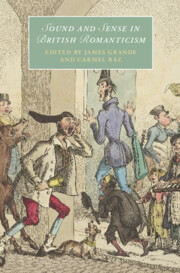Sound and Sense in British Romanticism
A radical re-imagining of the relationship between sound and sense took place in Britain in the decades around 1800. This new approach reconfigured sound as central to understandings of space and temporality, from the diurnal rhythms of everyday life in the modern city to the ‘deep time’ of the natural world. At the same time, sound emerged as a frequently disruptive phenomenon, a philosophical and political problem, and a force with the power to overwhelm listeners. This is the first book devoted to the topic and brings together scholars from literary studies, musicology, history, and philosophy through the interdisciplinary frameworks of sound studies and the history of the senses. The chapters pursue a wide range of subjects, from ‘national airs’ to the London stage, and from experiments in sound to new musical and scientific instruments. Collectively, they demonstrate how a focus on sound can enrich our understanding of Romantic-era culture. This title is also available as Open Access on Cambridge Core.
James Grande is Senior Lecturer in Eighteenth-Century Literature and Culture at King’s College London. He was a postdoctoral research fellow on the European Research Council-funded project ‘Music in London, 1800–1851’. He has published extensively on Romantic-period radical writers including William Cobbett and William Hazlitt. He is a trustee of Keats–Shelley House, Rome, and editor of the Keats–Shelley Review.
Carmel Raz leads the research group ‘Histories of Music, Mind, and Body’ at the Max Planck Institute for Empirical Aesthetics in Frankfurt, Germany. Before going to Frankfurt, she was a postdoctoral research fellow at the Columbia University Society of Fellows. Her research focuses on the intertwined histories of Romantic music and medicine as well as on music theory in the Scottish Enlightenment.

